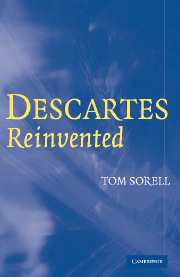Book contents
2 - Knowledge, the Self, and Internalism
Published online by Cambridge University Press: 20 July 2009
Summary
There is a difference between a theory of knowledge that starts from a sceptically impregnable inner space and a theory of knowledge which insists that a first-person perspective is ineliminable and important to the theory of knowledge. Both sorts of approaches probably qualify as ‘Cartesian’ in some sense, but the second has no particular associations with solipsism or privacy. It works with a category of things directly evident to the self, but it does not have to define the directly evident as the residue of applying the method of doubt, and it can count some things as directly evident that would not survive the uncertainty of Meditation One. It implies that consciousness matters to epistemology, but it does not make consciousness disembodied or require that any one consciousness be cut off from other minds. Versions of this sort of approach are adopted by ‘internalists’ in the debate in analytic epistemology between internalism and externalism. Internalists hold, roughly, that the difference between true belief and knowledge depends on something accessible to consciousness of the knower – the reasons he accepts, say, rather than the kind of causal origins the true belief had outside the believer. The argument of this chapter is that there is something right in internalism and that no purely externalist approach to the theory of knowledge can be entirely satisfactory. This is the innocent Cartesianism in analytic epistemology.
THE AUTONOMY OF KNOWING AND THE ‘PREJUDICES OF CHILDHOOD’
To motivate innocent Cartesianism, it helps to start with Descartes himself.
- Type
- Chapter
- Information
- Descartes Reinvented , pp. 32 - 56Publisher: Cambridge University PressPrint publication year: 2005



